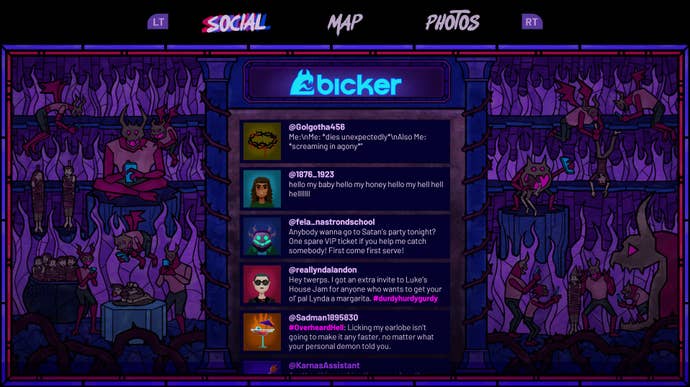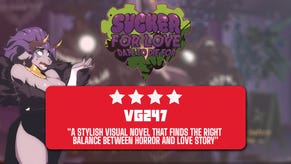Afterparty Review: Hell of a Good Time
Devilishly delicious.
This article first appeared on USgamer, a partner publication of VG247. Some content, such as this article, has been migrated to VG247 for posterity after USgamer's closure - but it has not been edited or further vetted by the VG247 team.
If you imagine hell in any form, it's not the hell you're going to find in Afterparty. I imagine "which religion got it right?" might be my first question if I woke up in the afterlife. If you watch The Good Place, the answer is "a bit of everyone," plus one stoned guy in New Jersey that came alarmingly close to predicting the true nature of the afterlife. If you're playing Afterparty, the answer is something along the lines of "doesn't matter, please stop asking, we're all very depressed in hell."
Afterparty is an adventure based mostly around conversations with folks who are just trying to get by in the depths of hell. You'll constantly flit back and forth between playing Milo and Lola, brought to life with the incredible tones of Khoi Dao and Janina Gavankar, respectively. They'd both fit perfectly into the Loser's Club from It: they're awkwardly shy, nervous in social situations, and have crippling family baggage. In that respect at least, they're relatable after they've died and gone to hell. The conversational dialog flows at a rapid pace to match the biting script, and you'll need to choose from one of two (or three, if you're drunk) responses to any questions that are thrown at you by the denizens of hell. The personalities of Milo and Lola can be affected by the conversation choices you make, which in turn determines how creatures like your snarky Personal Demon behave towards you.
It's primed for subtle differences between playthroughs, but Afterparty isn't a choice-driven adventure at its core. Outside of conventional conversation choices, Afterparty switches out small mechanics for each party-related activity. You'll need to line up a shot perfectly using a projected travel arc with beer pong for example, or press buttons in the correct order to match a routine and win a dance-off. These are designed to be smaller side activities, but they really go a long way to making hell feel "lived in" and more active, instead of just a sea of blood and torture.
Satan is an oversized demon with near-crippling anxiety and social responsibilities, and so too are most of the demons you'll meet. There's Sam the taxi driver (yes, there are taxis in hell), and many other colorful characters who are all a bit grumpy for one reason or another. There's the bartenders who begrudgingly serve Milo and Lola a lethal combination of cocktails along with a volley of personal insults, for example, or the processing demon that can't be late home because they need to get the best parking spot on the block. Afterparty does a good job of humanizing hell, so much so that you forget that all the other humans you see here are scheduled to be tortured until the end of time.

Characters are only as good as the script they're working from, luckily Afterparty has some incredible writing. There's biting satire throughout, not limited to but including a rap duo who perform a song which mentions how white people sure used to love slavery, the fact that Satan has a Greg Hardy jersey framed on his wall (f**king hell there's a lot to unpack there), and the assertion that the Salem Witch Trials just murdered all the midwives while the witches got off scott free.
In Afterparty, hell even has its own version of Twitter called Bicker, which is a pretty accurate description of what Twitter is used for 98% of the time. You'll see Bicker notifications pop up while you're walking around the islands on the inferno, highlights of which include a grandmother needing her grandson to die so she has tech support in hell again, and God's Archangels being referred to as "God's Seal Team 6." I'm honestly having a hard time with deciding where the writing is at its finest in Afterparty, but it might just be the cultural satire that Bicker provides so deftly.

Afterparty's selling point might be "flirting with Satan" (the developer's words, not mine), but you shouldn't overlook the journey to get to the big showdown. There's plenty to adore about hell in Night School Studios' small adventure, from the demonic denizens that lurk in bars and shadowy sidewalks, to the hell-themed cocktails and subtly poignant conversations, all adorned with razor-sharp wit and writing.
ConclusionNight School Studios have made hell intriguing and complex, with punchy dialog and relatable characters, be it human or demonic. The humor and writing is where Afterparty shines the most, breathing life into every character it touches—be it short and sarcastic, or emotional and reverent. Like the Beastie Boys' "Fight for Your Right (To Party)," what seems like dumb entertainment can evolve into something a lot more meaningful if you're willing to look beneath the surface.










